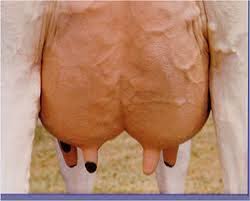udder
英 [ˈʌd.ər]
美 [ˈʌd.ɚ]
- n. (牛、羊等的)乳房
星级词汇:

中文词源
udder 母牛,母羊等的乳房
来自古英语udder, 来自拉丁语uber, 牛羊等的乳房,乳汁,词源同exuberant.
英语词源
- udder
-
udder: [OE] Udder goes back ultimately to prehistoric Indo-European *ūdhr-. This, or variants of it, produced the word for ‘udder’ in the majority of Indo-European languages: Greek oúthar, Latin ūber (source of English exuberant), Sanskrit údhar, Russian vymja, German euter, Dutch uier, Swedish juver, and Danish yver for instance, as well as English udder.
=> exuberant - udder (n.)
- Old English udder "milk gland of a cow, goat, etc.," from Proto-Germanic *udr- (cognates: Old Frisian uder, Middle Dutch uyder, Dutch uijer, Old High German utar, German Euter, and, with unexplained change of consonant, Old Norse jugr), from PIE *eue-dh-r "udder" (cognates: Sanskrit udhar, Greek outhar, Latin uber "udder, breast").
权威例句
- 1. A cow's udder hangs loosely between its legs and produces milk.
- 母牛的乳房垂于腿之间用来产奶.
- 2. The calf fumbled for its mother's udder for milk.
- 小牛摸索着妈妈的乳房找奶吃.
- 3. These will bring all the nearby farmland udder irrigation.
- 这些将使附近所有农田都得到灌溉.
- 4. Also, the organ udder becomes hot, painful and enlarged, and the animal may not eat.
- 同时, 乳房发热, 疼痛,便大, 以至动物不能进食.
- 5. Also, the udder becomes hot, painful and enlarged and the animal may not eat.
- 而且, 乳房会发热, 疼痛并胀大,动物还可能会不吃东西.
